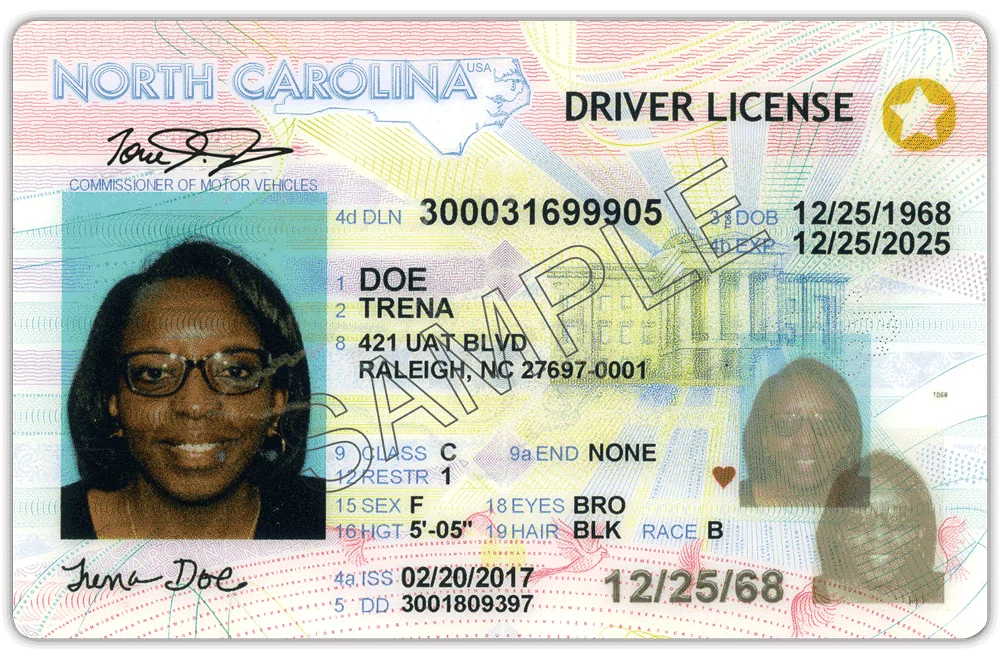North Carolina
ID Scanning Laws
In the state of North Carolina, the laws and regulations surrounding the scanning of identification (ID) cards, such as driver’s licenses, are governed by specific statutes. The law allows for the scanning of IDs for the following purposes:
- Verifying a guest’s age
- Establishing a guest’s identity
- Confirming a guest’s license status to operate a vehicle
- Disclosing such information to another business for:
- Verifying a check payment
- Evaluating creditworthiness
- Detecting or reducing the risk of fraud, abuse, identity theft, or other crimes
- Collection activities
- Confirming that a guest has met the motor vehicle financial responsibility requirements
- Disclosing such information to:
- The department of transportation
- Insurance licensees
- Notaries
- Financial institutions if permitted by federal law
- Law enforcement agencies




North Carolina State Legislature
ID Scanning Resources
The Legal Framework
North Carolina ID Scanning Laws and Regulations
In North Carolina, the law regulates a business’s ability to scan IDs and retain information obtained from a scan. There are instances where businesses are required to record information related to identity, such as in scrap metal recycling. ID scanning can improve the ease and accuracy of record keeping in these scenarios.
North Carolina law requires the Division of Motor Vehicles to establish and operate an “electronic system” that can be used by retailers and alcohol sellers (ABC permit holders) to verify the validity of a consumer’s ID and the date of birth to prevent the use of fictitious IDs used for purchasing age-restricted products or committing crimes. The businesses may retain information obtained through such verification as is necessary to provide evidence that the consumer’s ID was validated or age verified. “Electronic system” is not specifically defined but appears broad enough to consist of a scanning system used by retailers and alcohol sellers.
Other than for the purposes stated above, retailers and alcohol sellers are not allowed to collect, retain, transfer, or disclose any information obtained through the electronic system. While the language of the applicable statute is not clear, businesses are likely allowed to scan IDs for the purpose of preventing unauthorized purchase of age-restricted goods or commission of crimes, and information so obtained may be retained to establish evidence that the consumer’s ID was validated or the consumer’s age was verified. For all other purposes, businesses are unlikely allowed to scan IDs or retain information obtained from such scans.
To the extent the “electronic system” subject to the applicable statute does not include a scanning system used by businesses, there would be no North Carolina law regulating a business’s ability to scan IDs and to retain information obtained from a scan. Violation of these regulations is considered a Class 2 misdemeanor.
ID Scanning in Hotels: What You Need to Know
As a hotel operator in North Carolina, it’s essential to understand how these laws apply to your business. Here’s a breakdown of what you need to know:
Verifying a Guest’s Age and Identity
In North Carolina, hotels are permitted to scan IDs for the purpose of verifying a guest’s age and identity. This is particularly important if your hotel sells alcohol or provides other age-restricted services. The information obtained from the scan can be retained as evidence that the guest’s ID was validated and their age verified.
Retaining and Using Information from ID Scans
Hotels are allowed to retain and use information obtained from ID scans only for the following purposes:
- Verifying a guest’s age
- Establishing a guest’s identity
- Confirming a guest’s license status to operate a vehicle
- Disclosing such information to another business for:
- Verifying a check payment
- Evaluating creditworthiness
- Detecting or reducing the risk of fraud, abuse, identity theft, or other crimes
- Collection activities
- Confirming that a guest has met the motor vehicle financial responsibility requirements
- Disclosing such information to:
- The department of transportation
- Insurance licensees
- Notaries
- Financial institutions if permitted by federal law
- Law enforcement agencies
Restrictions on Information Use
Other than for the purposes listed above, hotels are not allowed to collect, retain, transfer, or disclose any information obtained through the electronic system. This means that any information obtained from an ID scan must be used strictly for the purposes outlined in the law.
North Carolina Senate Bills and Statutes
Several North Carolina Senate Bills and Statutes govern the use of ID scanning in the state. Here are some of the most relevant ones:
North Carolina Statute § 20-37.02 – Verification of Drivers License Information
This statute mandates the establishment of an electronic system by the Commissioner of the Division of Motor Vehicles. This system is designed to facilitate access to drivers license information by retailers and persons holding ABC permits to prevent the use of fictitious identification for underage purchases of certain age-restricted products or to commit certain crimes.
North Carolina Statute § 18B-302 – Sale to or Purchase by Underage Persons [Alcohol]
This statute provides an affirmative defense for ID scanning for both tobacco and alcohol sales. It states that it is a defense to a violation of the law if the seller shows that the purchaser produced a driver’s license, a special identification card, a military identification card, or a passport, showing the purchaser’s age to be at least the required age for purchase and bearing a physical description of the person named on the card reasonably describing the purchaser.
North Carolina Senate Bill 530 – Prohibition of Distribution of Tobacco-Derived Products and Vapor Products to Minors
This bill prohibits the distribution of tobacco-derived products and vapor products to minors. It also provides a defense to any action brought under the law if the defendant demanded, was shown, and reasonably relied upon proof of age.
North Carolina Statute § 66-421 – Required Records and Receipts for Regulated Metals Transactions
While this statute primarily applies to the scrap metal recycling industry, it provides a useful reference for businesses required to keep records of transactions involving identity verification.
Please note that this information is intended to provide a general overview and does not constitute legal advice. Always consult with a legal professional for advice specific to your situation
North Carolina Anti-Trafficking Network
Our Fight Against Human Trafficking



Knowledge Base
Frequently Asked Questions
Yes, hotels in North Carolina can scan IDs for the purpose of verifying a guest's age and identity, particularly if the hotel sells alcohol or provides other age-restricted services.
Hotels can retain information necessary to provide evidence that the guest's ID was validated and their age verified. They can also retain information for the purposes outlined in the law, such as verifying a check payment, evaluating creditworthiness, and detecting or reducing the risk of fraud, among others.
Yes, but only with specific entities and for specific purposes as outlined in the law. These include the department of transportation, insurance licensees, notaries, financial institutions (if permitted by federal law), and law enforcement agencies.
Violation of these regulations is considered a Class 2 misdemeanor in North Carolina.
Yes, the law provides an affirmative defense if the hotel can show that the guest produced a valid ID showing their age to be at least the required age for purchase and bearing a physical description reasonably describing the guest.
While the laws are broadly applicable, certain provisions specifically apply to retailers and persons holding ABC permits. However, the principles outlined in the law can serve as a useful guide for all businesses, including hotels, that use ID scanning technology.
